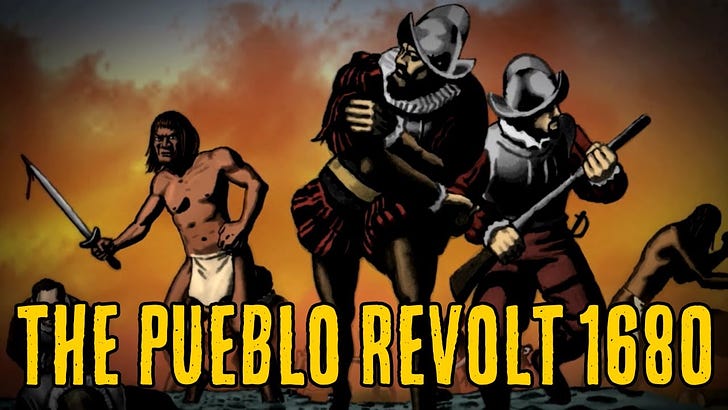The First American Revolution: The Great Pueblo Revolt of 1680
Resistance is not always futile
I’ve received several requests to post more history videos, so I’m going to emphasize that this year. Hopefully we’ll all learn a thing or two.
I decided I may as well begin with the first partially successful popular revolution on American soil. My own direct ancestors were not involved, but my stepkids’ definitely were. They have Pueblo ancestry, you see, from the very heart of this rebellion that started 345 years ago.
This is an objective take on the subject that’s less than 20 minutes long, and I hope you enjoy it.
From a historian’s perspective, this is great stuff. The Spanish had subjugated the Pueblo, and the Hopi, over a century before. As the video talks about, that period of Spanish rule was harsh, full of religious repression, slavery, deprivation, and a lot of death.
In the 1670s things got worse with a drought, the Spanish refused to lessen their demands for food, and the Pueblo as a people were dying. One gifted politician arose, traveled to dozens of different Pueblo towns, and united that tribe along with the Hopis, Apache, and Navajo to rise up against Spanish rule.
To make a long story short, the Pueblo succeeded for 12 years. They did drive out the Spanish in 1680. When the Spanish Empire made its third attempt to regain its lost province in 1692, there was little resistance, and within a generation the Pueblos were allies of first the Spanish and then the Mexicans, though the Hopi never submitted to the Spanish again.
Why? The revolt resulted in the freeing of hundreds of Spanish horses, which ran free onto the plains of eastern New Mexico, southern Colorado, and west Texas. The Apache and Navajo swiftly adopted the horse and started raiding the Pueblo incessantly. By 1692, Pueblo unity had fractured and some of them had hopes the Spanish might actually be a relief.
It took a few years, but in the end they were. The King of Spain issued orders for indigenous beliefs to be tolerated and for an end to forced labor and slavery of his New Mexico subjects. The Spanish Empire did not want another revolt, not with the French in Louisiana and the British in the Caribbean about to maybe take advantage of such a situation.
What’s important now is that the Pueblo are still there in New Mexico. They still have their culture, their religion, their sacred dances. If they hadn’t rebelled when they did, they may not have survived.
But they did, and the United States is a better country with them in it.
Thank you for reading and hopefully viewing, good day or night, and good luck.





Very informative and a salutary lesson.
And the languages are alive! You have connections to New Mexico?! I am from Boston area, but have lived in Albuquerque since 1997.